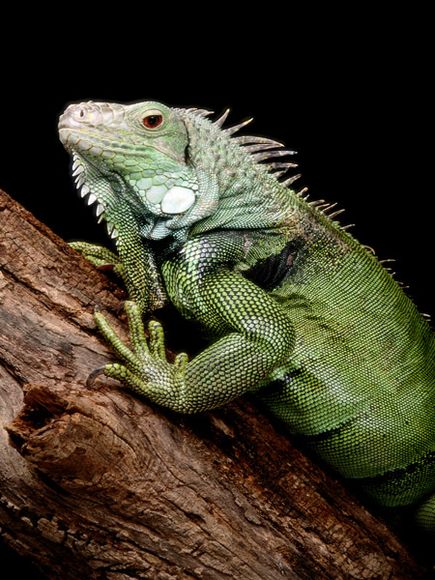Green Iguanas

Iguanas are native to Mexico, Central America, islands in the Caribbean, and South America. The species most frequently maintained in captivity is the green iguana (Iguana iguana), which lives in warm, humid rain forests. As free-ranging adults, they are large lizards, living in trees and eating leaves and blossoms. The pet industry is supplied mainly with young animals raised on iguana “farms” in Central America. Most, if not all, iguanas are infected with salmonella bacteria, so they are unsuitable pets for very young children and those with compromised immune systems. Good hygiene must always be practiced around pet iguanas. As soon as you have acquired your new iguana, schedule an appointment with our exotic animal specialist for a general health check and a fecal exam for parasites.
Iguanas have a dragon-like appearance and fascinating demeanor, making them unique as a family pet. As youngsters, iguanas may be quiet or flighty. With gentle, regular handling, most will learn that humans aren’t predators and will settle down. As iguanas approach maturity, at around 3 feet in length, they may begin to demonstrate seasonal aggression. Both genders can become quite dangerous during this time, with biting, tail-lashing and scratching. In some males this aggression may continue throughout the year.
Is my iguana Male or Female?
In young iguanas it may be difficult to visually distinguish a male from a female; therefore, veterinarians use a technique called probing to identify an iguana’s gender. In mature animals, the male normally has a taller dorsal spine, larger dewlap, larger operculum scales, bilateral hemipenal bulges at the base of the tail, and large, well-developed femoral pores.
Preventative Care
The most important factors in keeping an iguana healthy are diet, water and humidity, gradients of warm temperatures, and access to high quality ultra-violet-B light.
Diet
- Free-ranging green iguanas are herbivores, feeding on plants (leaves, flowers). In captivity the following can be offered daily:
- A variety of pesticide-free, calcium-rich greens, about 60-80% of the diet and at least two items per feeding: turnip greens, collards, mustard greens, beet greens, bok choy, Swiss chard, dandelions, parsley, romaine, escarole, cilantro.
- A fiber source, such as chopped grass, alfalfa hay or alfalfa pellets. These can be soaked prior to feeding.
- Other vegetables, about 10-20% of the diet: frozen mixed vegetables, grated carrot, squash, zucchini, sweet potato, bell pepper, broccoli, peas, beans, okra, sprouts, (soy, alfalfa, mixed salad).
- Fruits, no more than 10% of the diet: banana, papaya, melon, apple, plums, strawberries, tomatoes, grapes, kiwi, berries.
- Kale, spinach, tender mulberry leaves, rose petals, hibiscus flowers and leaves, and dandelion blossoms are treats that may be offered occasionally.
- Sunshine Factor may also be beneficial to iguanas.
All foods should be washed, chopped into bite-sized pieces, mixed together, and served at room temperature or slightly warmer. A calcium supplement, such as calcium carbonate, should be sprinkled on the salad every other day. Iguanas are naturally active in the daytime, so they should be fed in early morning.
Feeding schedule:
- Hatchlings (up to 14 inches)-every 12 hours.
- Young Iguanas (less than 2 feet)-daily.
- Mature Iguanas (longer than 3 feet)-every day or every other day.
Water and Humidity
Green iguanas need an environment of high humidity to stay healthy. They should be provided with a large, shallow water bowl for drinking and swimming. Many iguanas defecate only in their water bowl so the water needs to be changed daily and after each defecation.
Light Exposure
Iguanas need exposure to ultraviolet-B (UV-B) light rays changed every six months.
Tips
- Feed fresh, high quality, pesticide-free greens and chipped or grated raw vegetables.
- Offer access to fresh air and sunlight, or a UV-B generating fluorescent bulb daily.
- Follow your veterinarian’s recommendations for calcium or vitamin D3 supplements.
- Mist iguana twice daily with a fine spray of warm water.
- Always wash hands after cage cleaning and handling the iguana.
- Always keep the iguana and its bowls and cage furnishing away from the kitchen and dining areas
- Always disinfect sinks and tubs used to wash the iguana and its cage furnishings
- Always refrain from kissing the iguana
Housing for your iguana should:
- be as tall as possible, to accommodate a tree-dwelling lifestyle
- contain branches for climbing and basking
- Provide temperature gradients:
Daytime: 85-90°F
Daytime “Hot Spot”: 95-105°F in one corner
Nighttime: 75-80°F - Provide for 12-hour night/day cycles
- Include special UV-B generating light bulbs
- Be free of mirrors and other reflective surfaces
- Be clean, spacious, secure, safe and easy to service
- Contain easily cleaned substrate, such as Astroturf®, that can’t be accidentally ingested.
Avoid
- Meat Protein (including dog food, cat food, monky biscuit)
- Temperatures colder than 75°F
- Temperatures hotter than 105°F
- “Hot Rocks” in the enclosure
- Sunning the iguana outside in a glass enclosure (it may overheat)
- Free roam of the house
- Gravel, grit, cat litter, sand, pebbles, or wood chip substrate that may be swallowed
- Toxic fumes from paints, building materials or household cleaners.
- Dogs, cats or young children
Contact us if you notice reduced growth, poor appetite, depression, dull color, swelling of the bones in the face and legs, difficulty walking, climbing or chewing food, loss of weight, regurgitation, fractures, spasms or convulsions. Having your iguana examined on a regular basis by an exotic animal veterinarian who is familiar with reptiles can prevent many common disorders.
Courtesy of Zoological Education Network
Tampa, FL 33615 (View map)
Tampa, FL 33647 (View map)
Tampa, FL 33617 (View map)
Tampa, FL 33647 (View map)








